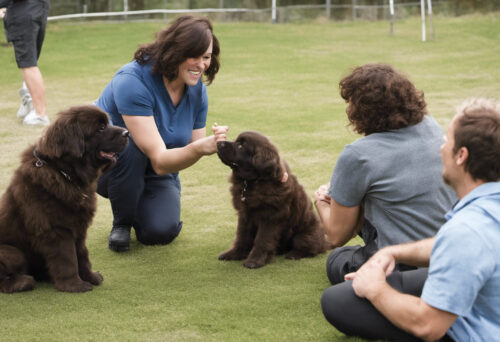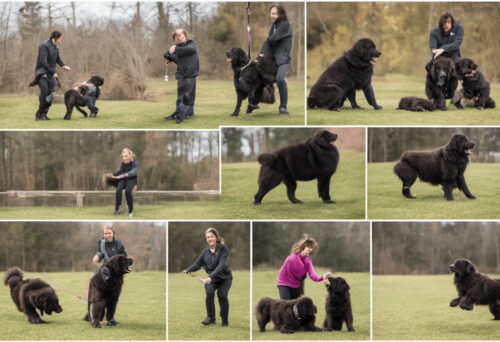Welcome Dog lovers! When it comes to schooling our loveable four-legged friends, certain breeds can present unique challenges and merits, and the majestic Newfoundland dog is no exception. Known for their colossal stature, strength, and notable sweetness, Newfoundland dogs can be a charm to train, if you’re equipped with the right knowledge. By understanding the breed’s distinctive quirks and requirements, training and socializing your Newfoundland can become a joyous journey for both of you!
The Temperament of a Newfoundland Dog
Before we delve into our training tips, let’s first understand the temperament of a Newfoundland dog. Known as ‘Nature’s Babysitter’, Newfoundlands are incredibly docile and patient. They are extremely protective, especially when it comes to kids. Their gentleness complements their strength, making them an ideal fur-friend for any home.
Key Tips to Train Your Newfoundland
Start Early for Effective Results
Given their large size, it’s especially crucial to begin training your Newfoundland while they’re still a puppy. The earlier you start, the easier it will be for you to manage and control them. According to the Your Purebred Puppy site, early training helps your pup understand basic commands and gradually inclines them towards more advanced learning.
Concentrate on Obedience Training
In contrast to other breeds, Newfoundlands thrive when they feel like a part of the pack. This breed responds well to a consistent, firm, yet loving trainer. Use obedience training techniques to establish yourself as a pack leader. Remember, your Newfoundland’s stubborn streak may show during training, but consistency and patience will yield positive results.
Socializing Your Newfoundland Dog
Make Socializing Fun!
Socializing should not be a task, but a fun activity for your breed. Expose them to a variety of environments, animals, and people. Use toys, playdates with other dogs, or visits to dog-friendly parks. According to PetMD, controlled exposure to different stimuli will make your Newfoundland more comfortable with new experiences and environments, thereby enhancing their social skills.
Involve Your Dog in Activities
Newfoundlands are incredibly energetic and love to partake in activities. Involve them in obedience classes, swimming, or perhaps agility training. The Newfoundland Club encourages involvement in such activities as they help in imparting key social skills to your furball.
Stay tuned as we delve deeper into the nitty-gritty of training and socializing your Newfoundland, in the upcoming sections of the article.

Newfoundland Training Techniques
Positive Reinforcement
The method of positive reinforcement works incredibly well for Newfoundland dogs. This involves rewarding your dog for desirable behavior which encourages them to repeat it. Treats are an effective reward. However, too many treats can lead to obesity; consider using praise, toys or walks as healthier alternative rewards.
Patience is Key
A Newfoundland’s natural protective instinct may cause them to be stubborn during training. Therefore, patience is a virtue when training your Newfoundland. Remember, training should not be a stressful experience for your dog. Ensure to keep the training sessions short and sweet to avoid frustrating your pet.
Where and When to Socialize Your Newfoundland Dog
Group Training Classes
Enroll your Newfoundland in group training classes. These classes provide a structured environment for your dog to interact with other dogs and people. They also instill solid obedience skills while your pet gets to socialize simultaneously.
The Perfect Timing
The prime time to socialize your Newfoundland pup is when they are between three and twelve weeks old, according to the Canine Journal. This period, known as the ‘socialization window’, is when they are most open to new experiences.
Health Considerations for Your Newfoundland
Watch for Signs of Stress
During training and socializing, monitor your Newfoundland for signs of stress. Signs including pinned ears, tail tucking or avoidance could mean your dog is overwhelmed. Always create a safe and positive environment for your furry friend.
Physical Health and Exercise
Keeping your Newfoundland healthy is paramount. Regular check-ups at the vet, a balanced diet and ample exercise will keep your pup in peak physical condition, which in turn aids their training and socializing.
In the concluding section of this article, we’ll go beyond training and socializing, discussing how to groom your Newfoundland and how to deal with common behavior problems. Until then, happy training!

The Art of Grooming Your Newfoundland
One key factor often overlooked during the training and socializing process of a Newfoundland is grooming. Establishing a grooming routine early helps your Newfoundland get used to being handled and also enhances your bond with them. A Newfoundland’s thick, double-layer coat means they require more grooming than many other breeds. The American Society for the Prevention of Cruelty to Animals recommends weekly brushing and regular baths to avoid matting and skin issues.
Watch Out for Ear Problems
Newfoundlands have floppy ears which can lead to frequent ear problems if unchecked. As part of your grooming routine, examine your dog’s ears carefully for signs of infection or parasites. Here are some tips to clean your dog’s ears from the Blue Cross.
An Insight into Newfoundland Behaviour Problems
While Newfoundlands are generally good-natured, they aren’t immune to behavioral problems. The two most common issues with this breed are separation anxiety and agility problems.
Dealing with Separation Anxiety
Like many large breeds, Newfoundlands may suffer from separation anxiety. This can manifest in destructive behavior, depression, and even disobedience. Experts at VCA Hospitals recommend counter-conditioning and desensitization treatments to ease the anxiety.
Overcoming Agility Problems
Due to their large size and weight, Newfoundlands are susceptible to joint problems which can hinder their agility. Regular exercise along with a proper diet can aid in maintaining their physical health. The Whole Dog Journal suggests that regular swimming can be great exercise for a Newfoundland, as it doesn’t stress the joints.
Build a Strong Bond with Your Newfoundland
Ultimately, training, socializing, and grooming your Newfoundland are all pathways to building a deeper bond with your fur-friend. Whether it’s learning new tricks, meeting other dogs, or enjoying a routine grooming session, each is an opportunity for you and your Newfoundland to enjoy each other’s company.
With these tips firmly in your grasp, you are now equipped to enhance your Newfoundland’s training process, socializing skills, grooming routine, and overall behavior. Good luck, we know you’ll do great!
To conclude, owning a Newfoundland can be an incredibly fulfilling experience if approached with the right training techniques, patient socialization, regular grooming, and an understanding of their unique behavior traits. As they say, the more you put into your relationship with your dog, the more you’ll get out. Breed specific knowledge plays a key role in this, and hopefully, this guide on Training and Socializing Newfoundland Dogs has equipped you to strengthen your bond with your furry friend even further.



